Rehabilitation Through Recovery Drinks: Solutions for Hangovers
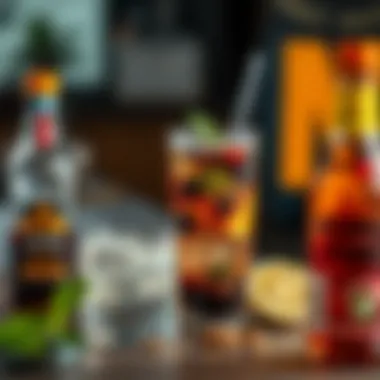
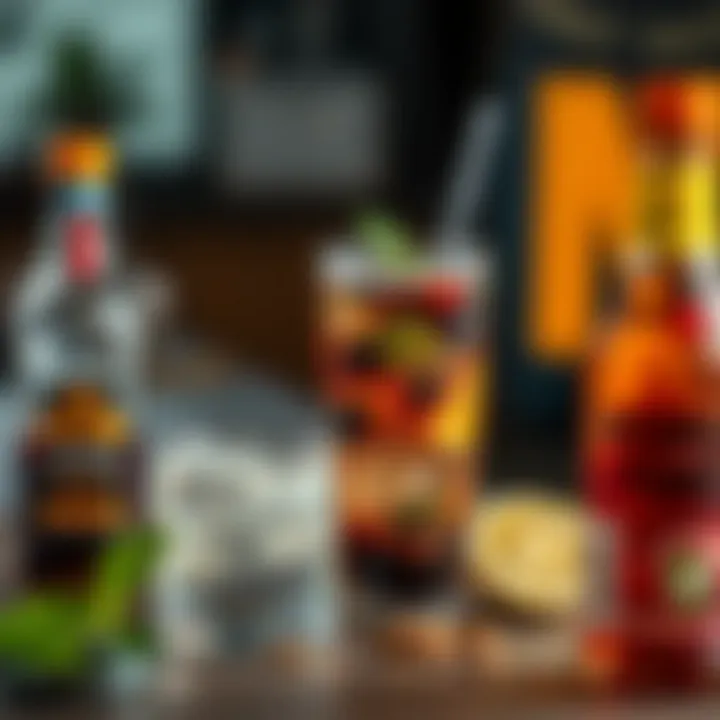
Intro
Addressing the aftermath of a night spent indulging is no trivial matter. Hangovers are often accompanied by a symphony of discomfort—headaches that pound like a drum, lethargy weighing down the body, and a parched throat that longs for relief. For many, the quest for recovery is closely tied to the consumption of recovery drinks, which claim to neutralize these unpleasant symptoms. This article aims to unpack the scientific mechanisms behind hangovers and explores the efficacy of recovery drinks in alleviating their various effects. By understanding the intersection of hydration, nutrition, and individual bodily responses, we hope to clarify just how these drinks can serve as effective solutions in a challenging situation.
Key Benefits
Recovering from a hangover is not solely about feeling better physically; it's also about restoring a sense of normalcy and clarity. Let's delve into the key advantages that recovery drinks provide, focusing on both physical health benefits and mental well-being enhancements.
Physical Health Benefits
When the body processes alcohol, it undergoes significant changes that contribute to hangover symptoms. One of the most pronounced effects is dehydration. Alcohol inhibits the production of vasopressin, a hormone that helps the kidneys manage water retention. As a result, individuals often find themselves in a state of fluid imbalance. Recovery drinks filled with electrolytes can help restore hydration levels. Additionally, these drinks often incorporate vitamins and minerals such as potassium and magnesium, which are essential for muscle function and overall energy levels.
Key Ingredients to Look For:
- Electrolytes like sodium, potassium, and magnesium to help with hydration.
- Vitamins such as B-complex and vitamin C that aid in metabolic processes.
- Natural sugars from sources like honey or coconut water for quick energy replenishment.
Mental Well-being Enhancements
The cognitive effects of hangovers can be debilitating—often leading to irritability, lack of concentration, and decreased overall mood. Recovery drinks that contain adaptogens or herbal extracts might offer a lifeline. Ingredients like ginseng and ashwagandha have shown promise in reducing stress and enhancing cognitive clarity. Furthermore, hydration can help alleviate anxiety that often accompanies the physical symptoms of a hangover, creating a holistic approach to recovery.
"The right formulation can turn a dreary morning into one where you feel ready to take on the day, even after a night of indulgence."
Practical Tips
When considering recovery drinks as part of hangover rehabilitation, it's important to integrate some practical strategies to maximize their effectiveness.
Effective Meal Planning
Post-party meals play a crucial role in recovery, helping to restore lost nutrients and energy. Focus on easily digestible foods that are rich in complex carbohydrates and proteins. Think about incorporating:
- Oatmeal with a dash of honey and nuts for a hearty breakfast.
- Eggs for protein and essential vitamins.
- Bananas for potassium replenishment.
Quick and Efficient Workouts
Gentle movement can also aid in recovery considerations. Engaging in short, low-intensity activities such as walking or stretching can enhance circulation and expedite toxin elimination from the body. It’s all about finding that sweet spot where movement feels beneficial without overwhelming the body.
In summary, recovery drinks serve as a multifaceted approach to confronting the unpleasant realities of a hangover. By embracing hydration, the right nutrients, and mindful practices, individuals can find their footing more smoothly on a rocky path to recovery.
Understanding Hangovers
The exploration of hangovers is not merely about enduring a morning after socializing but rather an intricate consideration of our body's response to alcohol consumption. Understanding hangovers is crucial in recognizing how recovery drinks can play a pivotal role in alleviating the aftermath. With the rise of social drinking habits, knowledge about the symptoms, causes, and remedies could be beneficial for a variety of professionals in the health and wellness industries.
In medical settings, practitioners may need to guide patients on recovery options that could enhance their wellbeing after a night of indulgence. For wellness coaches and nutritionists, developing tailored strategies using recovery drinks could bolster client satisfaction and health. As fitness trainers and mindfulness instructors often encounter clients dealing with the physical toll of hangovers, being informed helps them equip their clientele with effective solutions.
Defining a Hangover
Hangovers are commonly characterized by physical and mental disturbances following excessive alcohol intake. They generally manifest the day after prolonged drinking sessions and can last anywhere from several hours to a full day. The definition, however, is slightly more complex when we delve into the biochemical reactions that take place within the body. A hangover isn’t just your head pounding and stomach churning; it represents a failure of the body's systems to manage and recover from the onslaught of toxins that alcohol introduces.
Symptoms and Effects
Symptoms of a hangover can run the gamut from the classic headache and nausea to fatigue and dehydration. Individuals may also experience sensitivity to light and sound, a sense of demotivation, and decreased cognitive function. Common effects that individuals encounter can include:
- Nausea and Vomiting: The gastrointestinal tract reacts negatively to alcohol, leading to discomfort.
- Headaches: Vasodilation, or the widening of blood vessels, can cause headaches due to dehydration.
- Dehydration: Alcohol acts as a diuretic, which can lead to a deficiency in key fluids and electrolytes.
- Mood Disturbances: A hangover can result in irritability and anxiety levels rising, affecting mood positively or negatively.
The symptomatology not only hinders individual productivity but also affects overall quality of life, making understanding hangovers essential to both personal care and professional guidance.
Causes of Hangovers
Exploring the causes of hangovers reveals a plethora of interactions between alcohol and the human body. Ethanol, the main ingredient in alcoholic beverages, impedes the body's ability to produce hormone and enzyme levels efficiently, thus leading to diverse physiological impacts. Common causes include:
- Dehydration: As mentioned earlier, increased urine output can lead to dehydration.
- Chemical Compounds: Congeners, byproducts of fermentation found in darker liquors like whiskey or red wine, contribute to hangover severity.
- Impacts on Sleep: Alcohol may disrupt normal sleep cycles, leading to fatigue the next day as the body struggles to recover.
- Blood Sugar Levels: Alcohol influences glucose production, which can cause fluctuations in energy levels and cravings for sugar.
By comprehending hangover symptoms, effects, and causes, health professionals can better recommend tailored recovery strategies and drinks aimed at ameliorating these adverse conditions. This foundational understanding lays the groundwork for exploring the role recovery drinks play in mitigating the unpleasant consequences of alcohol consumption.
The Science of Recovery Drinks
Understanding the science behind recovery drinks is crucial because it forms the backbone of their efficacy in alleviating hangover symptoms. These drinks aren't just sugary juices; they encompass a carefully curated blend of hydration, electrolytes, and nutrients aimed at restoring what the body has lost during excessive alcohol consumption. This section dives into three main aspects: the importance of hydration, essential electrolytes, and the restoration of nutrients.
Hydration Importance
After a night of drinking, dehydration often becomes the main culprit behind those brutal hangoverait symptoms. Alcohol is a diuretic, meaning it increases urine production, which can lead to significant fluid loss. When your body is running on empty, headaches, fatigue, and even dizziness can strike like a thief in the night.
Thus, the role of hydration in recovery cannot be overstated. Recovery drinks are designed to counteract this dehydration. They help replenish lost fluids rapidly, kick-starting the recovery process. Most of these drinks are formulated with water as a base, but not all fluids are created equal. Unlike plain water, recovery drinks often contain added sugars and flavorings, which can help make the tedious task of hydrating a tad easier on the taste buds.
For maximum efficacy, look for drinks that have a balanced ratio of fluid and electrolytes, ensuring that your body can absorb them more effectively. It’s akin to quenching a fire with the right mix of water and foam: you want something that not only dampens the flames but also nourishes the ground you stand on.
Essential Electrolytes
Electrolytes, those positively or negatively charged minerals in our body, play a key role in keeping our cells functioning properly. When binge drinking occurs, sodium, potassium, and magnesium levels can plummet, leading to a physiological mess. These minerals are essential for regulating muscle contractions, nerve function, and even maintaining your body’s pH balance.
In the aftermath of a hangover, recovery drinks rich in electrolytes act like a rescue crew. Here’s a breakdown of some critical electrolytes and their roles:
- Sodium: Helps maintain fluid balance and blood pressure. A good level of sodium can counteract the effects of dehydration.
- Potassium: Essential in regulating heart rate and muscle function. It helps to adapt the body to various stress levels, including the stress caused by hangovers.
- Magnesium: Plays a key role in energy production and assists in muscle relaxation. Low levels can lead to muscle cramps, which only add to the uneasiness of a hangover.
By incorporating these minerals into recovery drinks, the body can quickly regain its lost balance. Add to this the added benefit of enhanced rehydration, and you have a recipe for a robust remedy.
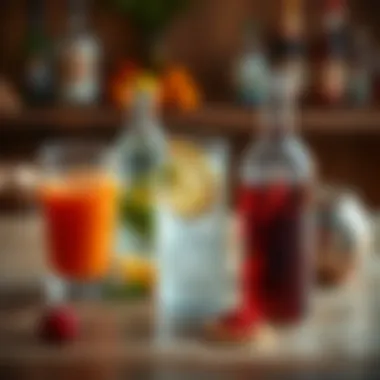
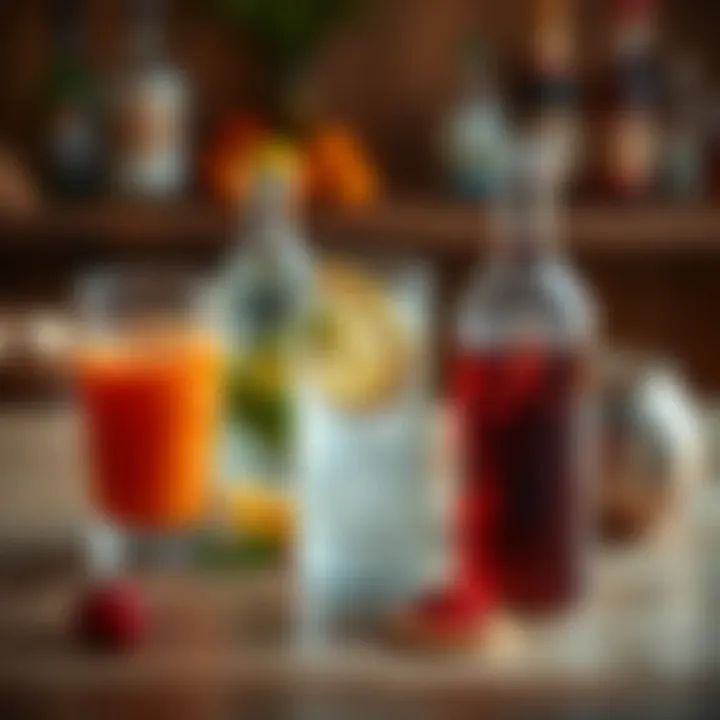
Restoration of Nutrients
Following a night of debauchery, it’s essential to replenish not only fluids and electrolytes but also the valuable nutrients that your body may have missed out on while partying. Consuming alcohol can inhibit the absorption of certain vitamins, leading to deficiencies that can exacerbate hangover symptoms. Recovery drinks can be fortified with key vitamins and minerals to address this.
Consider vitamins such as B-complex (especially B1, B2, and B6) which are pivotal for energy metabolism and reducing fatigue. Vitamin C, often relegated to the realm of cold remedies, aids in the body's detoxification process post-alcohol. Moreover, amino acids like cysteine can help neutralize the harmful byproducts of alcohol metabolism.
In essence, recovery drinks serve as a multi-faceted approach to recovering after heavy drinking, restoring hydration, balancing electrolytes, and replenishing lost nutrients.
By understanding these scientific principles, we can appreciate why selecting the right recovery drink after a hangover can be not just beneficial but, in some cases, essential. Whether opting for commercial products or homemade versions, recognizing the vital ingredients can empower individuals struggling with hangovers to make informed choices.
Key Ingredients in Recovery Drinks
Recovery drinks play a vital role in alleviating the toll that hangovers can take on the body. The key lies in understanding the ingredients packed into these beverages. Each component works synergistically to rejuvenate and restore, but it’s about more than just slaking your thirst. Let's explore the specific elements that contribute to their effectiveness and consider the benefits they offer in the recovery process.
Electrolytes and Recovery
Electrolytes are not merely a fancy term thrown around during health discussions; they are essential for maintaining fluid balance in the body. After a night of drinking, your electrolyte levels can take a nosedive due to alcohol’s diuretic effects, leading to dehydration.
Key electrolytes such as potassium, sodium, and magnesium are vital. Potassium aids in muscle function and heart health, while sodium helps retain fluids, preventing further dehydration. Magnesium is essential for energy production and can help mitigate headaches.
Including sources of electrolytes in recovery drinks can significantly improve hydration rates and enhance recovery speed. Sometimes, it could be a lifesaver if you're grappling with the fatigue and headaches of a hangover. If there's one lesson to be learned, it's this: don't overlook the power of the humble electrolyte.
Vitamins and Minerals
Our bodies sometimes need a helping hand, especially after a night of revelry. Vitamins and minerals become crucial in replenishing what was lost during heavy drinking sessions. Vitamin C, for instance, can bolster your immune system, aiding your body to bounce back quicker.
B vitamins, including B1, B2, and B6, play a role in energy metabolism, helping to minimize the fatigue often felt after drinking. Your liver can also benefit from antioxidant-rich vitamins like E. This not only supports liver function, but it can help counteract some of the oxidative stress incurred from alcohol consumption.
Consider recovery drinks enriched with these vitamins, as they can offer a nutritional safety net that often gets overlooked.
Herbal Additives
In the world of hangover cures, nature offers a bounty of remedy options within herbal additives. For instance, ginger is well regarded in various cultures for its anti-nausea properties. It can soothe the digestive system and may reduce feelings of queasiness caused by hangovers.
Another standout is prickly pear extract, which has shown promise in minimizing hangover symptoms when taken before drinking. It can help to curb inflammation and enhance hydration. Incorporating these herbs into recovery drinks taps into centuries of wisdom, bringing natural remedies to the forefront of recovery.
Proprietary Blends
The market is awash with proprietary blends designed specifically for hangover recovery. These blends are typically a combination of the above-mentioned ingredients and more. Companies carefully formulate them, sometimes even developing exclusive recipes that distinguish their products from the competition. Some proprietary blends might include amino acids, such as L-glutamine, to support gut health and cognitive function post-drinking.
These blends often aim to educate consumers on efficiency and quick absorption. Knowing what’s included in these blends can be essential for making informed decisions about the best recovery drinks suited to individual needs.
Commercial Recovery Drink Options
Exploring the realm of commercial recovery drinks reveals their considerable significance in combating hangovers. These specially formulated beverages often promise quick relief from symptoms through a combination of hydration, electrolytes, and essential nutrients. Many people turn to them as a primary solution after a night of indulgence, as they are readily available and easy to consume. However, understanding the variety of options available and their respective benefits is essential to making an informed choice.
Popular Brands
When one thinks about recovery drinks, several popular brands spring to mind. There's Pedialyte, traditionally aimed at children, but widely recognized as an effective remedy for hangover symptoms due to its high electrolyte content. Gatorade and Powerade are also staples, hailed primarily for their ability to replenish lost fluids and sodium after intense physical activities, yet equally effective in a post-party scenario.
Yet, brands like Liquid IV and DripDrop have surged in popularity, with their unique formulations targeting rapid hydration and delivering essential vitamins alongside electrolytes. Some offer herbal components, like Kava or Turmeric, which may offer additional recovery benefits. Knowing these brands not only helps one scope out effective products but encourages consumers to tailor their choices based on personal taste and specific recovery needs.
Comparative Analysis of Ingredients
Not all recovery drinks are crafted equal. While electrolytes are commonly showcased as the star ingredient, there’s much more beneath the surface.
- Electrolytes: Critical for maintaining fluid balance, sodium, potassium, and magnesium are commonly found across many brands. Each plays a vital role in hydration and restoring physiological balance.
- Vitamins: Certain drinks pack a punch with B vitamins or Vitamin C, which support metabolic processes and might ease hangover symptoms by facilitating toxin removal.
- Herbs and Botanicals: Ingredients like ginger, lauded for its anti-nausea properties, or milk thistle, believed to assist liver function, find their way into various blends, targeting those particularly rough mornings.
A thorough ingredient analysis helps consumers differentiate between gimmicks and genuine formulations that can aid recovery. Paying attention to the ingredient lists is imperative.
Cost vs. Efficacy
Another aspect to consider in the realm of commercial recovery drinks is the relationship between cost and efficacy. Premium brands often come with a hefty price tag, but do they offer a rationale for it? Often, these higher-priced beverages include high-quality organic ingredients or proprietary blends that make their claims of effectiveness feel more legitimate. For example, Liquid IV touts its unique Cellular Transport Technology, which is marketed as a more effective method for transferring hydration to your body's cells.
Alternatively, budget-friendly options like Gatorade still deliver fundamental hydration with fewer frills yet might not provide the holistic benefits that more specialized drinks do.
Ultimately, consumers must assess their budget against the effectiveness they seek, weighing between tried-and-true options and newer, potentially more effective formulations.
Whether it's a go-to brand for convenience or a higher-end drink that promises added benefits, choosing wisely in this space can make the difference between a slow recovery and a swift return to normalcy after a night of indulgence.
Homemade Recovery Drink Recipes
Creating your own recovery drinks at home can be both cost-effective and tailored to your personal taste and nutritional needs. Unlike commercial options, homemade recipes often allow you to know exactly what goes into your drink, ensuring that you can avoid unnecessary additives or allergens. These drinks can replenish vital nutrients and help combat those unwelcome hangover symptoms that often follow a night of indulgence.
Homemade recovery drinks can be especially beneficial for individuals with specific dietary restrictions or preferences. By selecting your ingredients, you can accommodate a range of needs, from gluten-free to vegan options. This article delves into various recipes, helping to equip you with the knowledge to whip up some beneficial concoctions that may aid in your recovery.
Basic Recipes
Starting with basic recipes, simplicity often leads to some surprisingly effective remedies. Here are a few foundational recipes that harness essential hydration and nutrients:
- Coconut Water Elixir:
- Classic Lemonade:
- Ginger Tea:
- Ingredients: 1 cup coconut water, 1 tablespoon honey, juice of half a lime.
- Instructions: Mix all ingredients in a glass until well combined. This drink provides electrolytes, natural sugars, and Vitamin C, which can help restore balance following a night of drinking.
- Ingredients: 1 cup water, juice of one lemon, 2 tablespoons honey, a pinch of salt.
- Instructions: Combine all ingredients in a jug. Lemon juice offers hydration as well as much-needed potassium, while honey acts as a natural sweetener and provides energy.
- Ingredients: 1 cup hot water, sliced fresh ginger (1-2 inches), honey to taste.
- Instructions: Steep the ginger slices in hot water for 10 minutes. Ginger is renowned for its anti-nausea properties, making it an excellent choice for mitigating hangover discomfort.
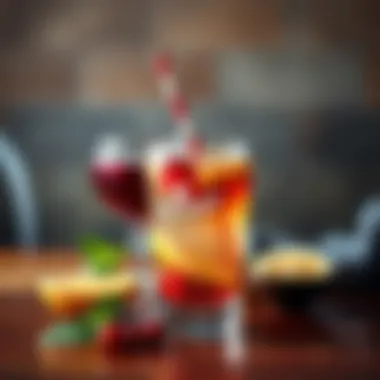
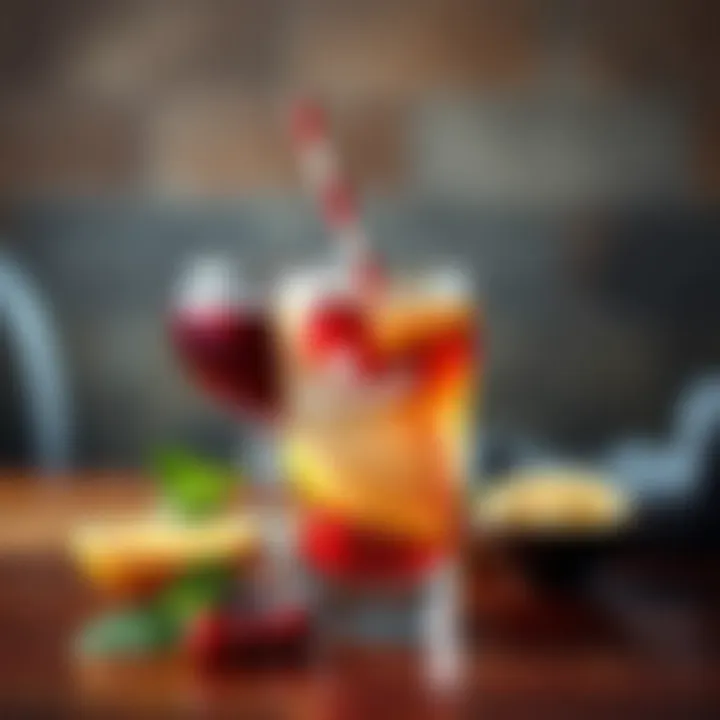
Advanced Combinations
For those looking to elevate their recovery further, advanced combinations can pack more punch with targeted ingredients. Here are a couple of recipes that add complexity:
- Berry Antioxidant Smoothie:
- Tropical Health Booster:
- Ingredients: 1 cup mixed berries (frozen or fresh), 1 banana, 1 cup yogurt or non-dairy alternative, 1 tablespoon chia seeds, 1 tablespoon honey, 1 cup almond milk.
- Instructions: Blend all ingredients until smooth. Packed with antioxidants from the berries, the banana adds potassium, aiding in preventing muscle cramps.
- Ingredients: 1 cup pineapple juice, 1 cup coconut water, 1 tablespoon spirulina powder, and a few mint leaves.
- Instructions: Mix the juices and stir in spirulina and mint. This bright beverage brings in minerals and vitamins, especially vital if you’ve lost electrolytes from drinking.
Tailored Solutions for Dietary Restrictions
Printing your own recovery drink can also ensure you can easily make something that fits various dietary requirements. Here are specific strategies for tailoring beverages:
- Gluten-Free Options: Most of the recipes shared above are naturally gluten-free. Ensure your additives, like protein powders, are certified gluten-free.
- Vegan-Friendly: Replace honey with maple syrup or agave nectar, which are plant-based sweeteners. Non-dairy yogurts or nut milk alternatives can also be utilized in smoothies.
- Low-Sugar Variants: If sugar is a concern, adjust sweeteners in a recipe or rely on naturally sweet fruits that balance flavor without added sugars.
Maintaining hydration and restoring crucial nutrients post-drinking doesn't need to come with a hefty price tag. With a little creativity, one can find solace in crafting homemade recovery drinks that cater to personal preferences and health needs.
"Homemade solutions often allow individuals to tend to their bodies in a way that mass-produced options simply cannot."
In summary, establishing a few homemade recovery drink recipes in your arsenal can be a lifesaver—not just for hangovers, but also for overall hydration and health maintenance.
Cultural Perspectives on Hangover Remedies
Exploring how various cultures deal with hangovers can provide valuable insights into the effectiveness of different remedies. This examination is significant, as it showcases diverse approaches and remedies that have harvested centuries of wisdom. Understanding these cultural perspectives not only enriches our knowledge of recovery drinks but also presents alternative methods that might work harmoniously with modern solutions.
Hangovers often bring varying degrees of discomfort, leading people to seek remedies that align with their cultural beliefs and dietary practices. Each remedy carries not just physical benefits but also social and historical significance, reflecting the practices of communities around the globe.
Global Remedies and Traditions
Across the world, various cultures boast time-honored traditions for alleviating hangover symptoms. For example:
- Mexico: Sopa de fideo, a noodle soup often infused with tomato and spices, is a popular choice for those recovering from a night of indulgence. The broth restores hydration while providing nutrients and comfort.
- Spain: Tinto de verano may sound celebratory, but it’s also used as a hangover cure, where a mix of red wine and soda is purported to ease the symptoms before they hit hard.
- Japan: Hiyashi chuka, a chilled noodle dish topped with various fresh vegetables, helps restore balance post-drinking with refreshing elements while being easy on the stomach.
- India: Ginger tea mixed with honey not only calms the stomach but also aids in rehydration and is often a go-to drink by those recovering from heavy drinking.
These remedies highlight the deep connection many cultures have with food and drink, showcasing how traditions evolve to meet the needs of the community.
Regional Variations in Recovery Drinks
The concept of recovery drinks is particularly intriguing within specific regions where local ingredients play a pivotal role in what people consume after a hangover.
- North America: Here, you might spot pickle juice as a popular hangover cure. The electrolyte-rich liquid is believed to combat dehydration effectively.
- Eastern Europe: In places like Russia, kvass made from fermented bread is enjoyed for its probiotic properties, supporting digestive health during recovery.
- Southeast Asia: Traditional drinks often include a base of coconut water or tamarind juice, providing hydration and essential minerals unique to the region.
- Middle East: An infusion of fresh mint and lemon in water serves as a refreshingly palatable drink after consuming alcohol, rejuvenating the body with natural flavors.
These regional adaptations underscore a crucial point: the effectiveness of a recovery drink can be deeply rooted in the local culture and produce. By tapping into traditional practices, it becomes clear that remedies are not one-size-fits-all. Instead, what works in one culture may resonate differently in another, calling for an appreciation of varied dietary habits.
"The effectiveness of a hangover remedy may not only lie in its ingredients but also in the cultural beliefs surrounding its consumption."
In scrutinizing the cultural perspectives on hangover remedies, we draw on the wealth of knowledge surrounding various diets and traditions. This opens avenues for combining elements from different cultures into modern recovery drinks, allowing us to create holistic solutions aimed at alleviating hangover symptoms effectively.
Best Practices for Prevention
Preventing hangovers is often seen as the ultimate goal for those who partake in alcoholic beverages. It’s essential to grasp that not every hangover is created equal. Several factors come into play, such as individual tolerance levels, the type of alcohol consumed, and even food intake prior to drinking. Implementing best practices is a proactive approach that can significantly help reduce the severity of hangovers and enhance overall well-being.
Moderation in Alcohol Consumption
It’s an age-old adage that everything is best enjoyed in moderation, and this rings particularly true when it comes to alcohol. Overindulgence can lead not only to nasty hangovers but to potential health hazards. Moderation means knowing your limits and sticking to them. For many, this translates to enjoying no more than one drink per hour and keeping track of the number of drinks consumed.
Some key points to consider include:
- Choosing lower-alcohol options when possible.
- Setting a drink limit ahead of time to avoid impulsive decisions.
- Spacing out drinks with non-alcoholic beverages like water or soda to mitigate the effects of alcohol.
Implementing these habits paves the way for a more enjoyable experience without the post-party regrets. Remember, a wiser choice today could mean a clear head tomorrow.
Staying Hydrated
Hydration is crucial, especially when booze is involved. Alcohol acts as a diuretic, which can lead to dehydration. When the body loses more water than it takes in, the stage is set for a headache, dry mouth, and fatigue—the all-too-familiar symptoms of a hangover.
To combat this, one should prioritize drinking water throughout the night. An effective strategy might include:
- Sipping water alongside alcoholic beverages.
- Drinking a glass of water before bed, as it can work wonders overnight.
- Incorporating electrolyte-containing drinks, like coconut water, to replenish lost nutrients.
By keeping the body hydrated, one lays a foundation that may significantly lessen the hangover aftermath.
Nutritional Considerations Before Drinking
Your pre-drinking meal can be a game-changer; it’s all about what you eat before indulging. Foods rich in carbohydrates and fats help slow the absorption of alcohol, directly impacting how your body copes.
Consider these nutritional tips:
- Opt for a meal high in protein and healthy fats, such as chicken or avocado, to create a barrier against alcohol absorption.
- Snack on complex carbs like whole grain breads or pastas, which provide sustained energy and mitigate the impact of alcohol.
- Stay away from overly salty or greasy foods, as they can leave you feeling sluggish and might prompt increased thirst.
Ultimately, a thoughtful approach to nutrition before drinking can have lasting effects, ensuring you stay in control and minimize the risk of tomorrow's hangover.
"An ounce of prevention is worth a pound of cure." Taking measured steps today can make a considerable difference in your body's response.
The Role of Lifestyle Factors in Hangover Severity


When discussing hangovers, many folks tend to overlook the bigger picture — the lifestyle choices that can make hanging over feel like a train wreck. It’s not just about what you drink, but how you life your life overall, from sleep habits to daily stressors. Understanding these factors can be a game changer when it comes to managing hangover symptoms. Here, we uncover essential elements that play crucial roles in hangover recovery and prevention.
Sleep Patterns and Recovery
Sleep and hangovers have a dance more intricate than a waltz. When you overindulge the night before, the likelihood of a solid night’s sleep often takes a nosedive. After all, alcohol has a tricky relationship with our sleep cycles. While you might doze off quickly, your sleep is often fragmented and less restorative. This leads to daylight fatigue, exacerbating hangover woes.
A few hours of quality sleep can work wonders. It’s during sleep that your body gets to do some heavy lifting — repairing tissues, regulating hormones, and flushing out toxins. Prioritizing sleep the night after a night out might just shave some hours off of your struggle the next day.
Consider these tips to enhance sleep quality:
- Create a Sleep Sanctuary: A cool, dark, and quiet room is essential for peace.
- Limit Electronics: As tempting as it is to scroll through your phone, the blue light messes with sleep hormones.
- Hydrate Wisely: While hydration is key, avoid drinking too much right before bed to prevent interruptions.
By ensuring that your sleep patterns are healthy, you support your recovery process from a hangover and increase your chances of bouncing back more swiftly.
Stress and its Impact
Stress, that unwelcome companion, can throw a wrench into recovery mechanisms. When your body is under stress, it releases hormones like cortisol, which can affect your body's ability to recover from hangover symptoms. A stressed-out body may produce fewer endorphins and engage in inefficient metabolic processes, leaving you feeling like you're moving through molasses the day after a good night out.
There are a few avenues worth exploring to mitigate this stress:
- Mindfulness Practices: Everything from yoga to meditation can help you keep your stress levels in check.
- Regular Exercise: A little sweat can help clear stress hormones and jumpstart endorphins, making recovery smoother.
- Social Support: Surrounding yourself with positive people post-binge can uplift your spirits. Share your experience and swap remedies; communal experiences can hasten recovery.
Understanding these elements and implementing changes to improve your sleep and stress management can steer you clear of worst hangover experiences.
"The body keeps score, especially when it comes to how we treat it during revelry. Taking care of your health means being thoughtful about how you live every day, not just when the party is on."
Prioritizing lifestyle adjustments could very well turn out to be the unsung heroes in the battle against hangovers. Not only does it support your recovery, but it lays a foundation for better habits down the road.
Science Behind Claims: Dissecting Myths
Understanding the science that underpins the claims surrounding recovery drinks is essential when discussing their efficacy in alleviating hangovers. Many individuals turn to these beverages hoping to find a quick fix for the unpleasant symptoms of overindulgence. However, there are a variety of misconceptions surrounding what these drinks can actually deliver. The aim here is to explore and clarify these myths, ensuring that individuals have a clear perspective before relying on such solutions.
Common Misconceptions
When it comes to hangovers and recovery drinks, some widespread misconceptions can mislead consumers. Here are some notable examples:
- All hangover cures are the same: One common belief is that all recovery drinks offer the same benefits. In reality, the composition of these beverages varies widely, and their effectiveness is often dependent on the ingredients they contain.
- Sugary drinks help recover faster: Many think that recovery drinks high in sugar can enhance recovery. However, sugar can lead to further dehydration, counteracting the drink’s benefits.
- Electrolytes alone will do the trick: While electrolytes are crucial for hydration, they are not the only components needed for full recovery. A well-rounded recovery drink should also address the nutritional deficiencies caused by alcohol consumption.
- Caffeine is helpful: Some individuals believe that caffeine can revive them from a hangover. This is misleading as caffeine can lead to further dehydration, worsening hangover symptoms.
Understanding these misconceptions is key. By distinguishing fact from fiction, individuals can make informed choices about their recovery efforts.
Debunking Hangover Cures
Numerous hangover cures are promoted as miraculous solutions, yet their effectiveness is often exaggerated. Let’s dissect and debunk a few of the most common claims:
- The "hair of the dog" approach: This saying suggests that consuming more alcohol can cure a hangover. While it may momentarily alleviate symptoms, it merely delays the inevitable—and can even lead to a longer recovery period.
- Miracle ingredients: Many products tout exotic superfoods or herbal extracts as game-changers in hangover recovery. While certain herbs may offer health benefits, they typically do not provide a one-size-fits-all solution for hangover symptoms.
- Instant cures: Claims of drinks that promise instant relief should be taken with a grain of salt. The complexity of hangover recovery involves physiological processes that take time to restore balance, and there isn’t a shortcut.
"Recovery from a hangover is not just about rehydration; it requires a careful balance of time, hydration, and nutrition."
Evaluating Efficacy of Recovery Drinks: A Critical Look
Evaluating the efficacy of recovery drinks is paramount to understanding how effective these beverages are in alleviating the unpleasantness of hangovers. This exploration goes beyond simply answering whether these drinks work; it invites practitioners, health professionals, and nutritionists to consider how various ingredients interact with the body's processes during recovery. With a plethora of products available on the market, discerning which are truly beneficial can be a daunting task.
The key focus here lies in not just the ingredients listed on the label, but in the nuanced ways they contribute to overall recovery. Practitioners may be interested in the differing effects of electrolytes versus vitamins and how those factors relate to hydration and energy restoration. Additionally, examining personal experiences paired with scientific insights offers a holistic understanding of their practical effectiveness.
Personal Experiences and Case Studies
When it comes to assessing recovery drinks, personal anecdotes can shed light on their real-world application. For instance, individuals often share varied experiences with specific brands, emphasizing how they felt more hydrated or less fatigued after a bout of drinking. Let's look at a few anecdotal accounts for some context:
- A wellness coach reported success with coconut water, claiming it not only improved hydration but also offered a refreshing taste that helped curb their hangover symptoms significantly.
- An athlete shared their experience using a commercially available recovery drink containing branched-chain amino acids. They noted a decrease in both hangover severity and recovery time post-drinking.
- A nutritionist stated that homemade recipes incorporating ginger and lemon not only soothed their stomach but also invigorated their energy levels the next day.
These anecdotal examples provide valuable insights but should be taken with caution. The subjective nature of personal experiences means results can vary significantly between individuals, influenced by factors such as biology and dietary habits.
Scientific Research Insights
Scientific studies play a vital role in demystifying the claims surrounding recovery drinks. A review of literature highlights some prevalent findings:
- Electrolyte Replenishment: Studies confirm that low electrolyte levels can exacerbate hangover symptoms. Properly formulated recovery drinks with sodium and potassium can help replenish what is lost during dehydration caused by alcohol.
- Vitamin B and C Role: Research indicates that B vitamins may aid in alcohol metabolism and reduce the severity of hangovers. Vitamin C's contribution to immune function and its antioxidant properties can also provide supportive roles during recovery.
- Policy and Guidelines: Regulatory bodies often set forth guidelines on what constitutes an effective recovery drink. Reviewing these guidelines can help establish standards for both ingredients and efficacy, paving the way for more informed consumer choices.
Integrating experiential narratives with scientific data enhances the comprehensive view of recovery through drinks, allowing for a more substantiated understanding and awareness.
In summary, evaluating the efficacy of recovery drinks requires a balanced approach—one that incorporates both personal experiences and scientific research. This dual perspective enriches our understanding and guides practitioners in making informed recommendations. Future studies and shared personal insights will pave the way for deeper inquiries into optimizing recovery protocols for hangover relief.
Culmination: The Path Forward
As the understanding of hangover relief continues to evolve, it's clear that recovery drinks have carved out a significant niche in the quest for effective solutions. The journey towards alleviating hangover symptoms is multifaceted, intertwining hydration, nutrient replacement, and sometimes even a touch of cultural tradition. This concluding section synthesizes the varied insights from earlier discussions and underscores critical concerns and future developments in the realm of recovery drinks.
In today's world, where health is often front and center, the role of recovery drinks cannot be understated. They not only address the immediate discomfort following a night of indulgence but also offer a pathway to a more mindful approach to consumption. By harnessing the right ingredients, such as electrolytes and vitamins, these beverages can significantly buffer the impact of dehydration and nutrient loss that typically follows excessive drinking.
"Understanding the potential benefits of recovery drinks is not just about mitigating hangovers; it’s about embracing a holistic view of health and wellness."
Future Trends in Recovery Drinks
Looking ahead, the landscape of recovery drinks is likely to shift further towards personalized nutrition. As consumers become more informed about their health needs, the demand for customized solutions is expected to rise. Companies might start offering tailored recovery drink formulas that cater to individual preferences, dietary restrictions, and even specific hangover symptoms.
Moreover, as research into the physiological effects of alcohol progresses, new ingredients may emerge, demonstrating enhanced efficacy in combating hangover symptoms. For example, functional herbs and adaptogens are gaining attention for their potential revitalizing properties. Understanding how these elements interact with typical hangover symptoms could radically change how we approach creating recovery drinks.
Integrating Recovery Strategies into Lifestyle
Beyond relying solely on recovery drinks, it’s vital to integrate these solutions into a broader lifestyle strategy. Picture this: instead of waiting until the morning after a night out, one could incorporate essential practices into daily life that help minimize the likelihood of hangovers in the first place. Simple changes in routine, such as staying well-hydrated throughout the week, prioritizing a balanced diet rich in fruits, leafy greens, and whole grains, and establishing a regular sleep schedule can significantly reduce hangover severity.
Additionally, elevating social drinking norms to include mindful consumption can create a healthier mindset around alcohol. Encouraging friends and communities to share knowledge about hydration and nutrition while partaking in celebrations fosters a collective approach to reducing hangover experiences. By adopting preventive measures alongside effective recovery solutions, individuals are empowered to make informed choices that promote their overall well-being.
In summary, the path forward in addressing hangovers centers on understanding the multifactorial nature of this post-consumption issue. By viewing recovery drinks not merely as quick fixes but as components of a more extensive wellness strategy, both consumers and health professionals can contribute to a more health-conscious culture.















